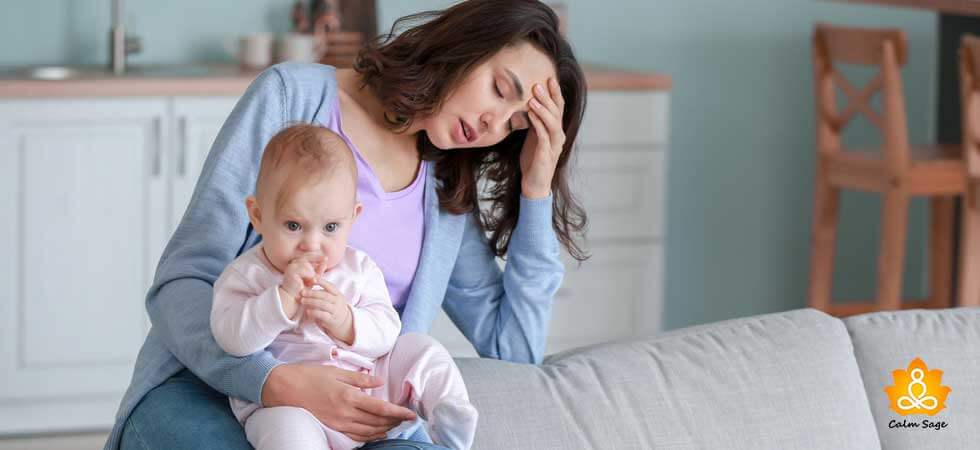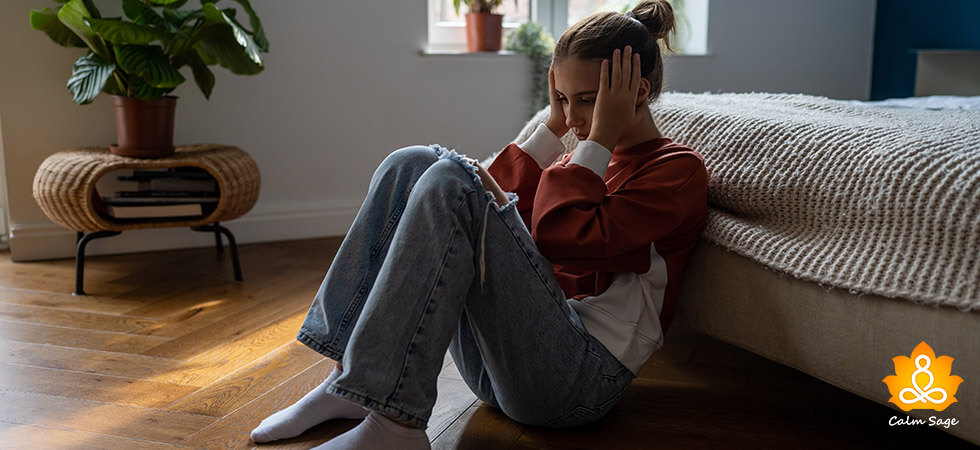Let’s Talk About Postpartum Anxiety (And Ways To Manage New Parenthood)

Welcoming your newborn into your home is probably the most memorable experience of any new parent’s life. After months of nurturing and caring for your baby, it’s natural to feel apprehensive and worry about the little things your newborn does or what they don’t. Not on; y that but it’s common for new parents to wonder how well their newborn is eating or whether they are getting enough sleep.
All of these worries are pretty normal, but sometimes when these worries become excessive (bordering on obsessive), it could be a sign of anxiety, or more likely – postpartum anxiety.
Postpartum or post-natal anxiety is when your anxious thoughts and over-worrying nature seems out of control, and you are always on edge worrying about your newborn and your new parenthood. Yes, it’s more than just new parent jitters.
While postpartum depression has taken a lot of attention, let’s meet its estranged sister – postpartum anxiety disorder in this article. We’ll be exploring what is post-natal anxiety, the symptoms you should look out for, the causes, and impact, and how you can manage new parenthood, anxiety-free.
What Is Postpartum Anxiety?

The anxiety that comes after giving birth is what we can call postpartum anxiety. While it’s not commonly known, anxiety after birth is as real and valid as postpartum depression. After birth, the mother’s body goes through many changes – physically, biologically, and mentally. In a study, it was found that at least 12% of adults experience anxiety disorder after giving birth.
Because post-natal anxiety is a new issue of interest, studies on postpartum anxiety disorder are limited. More evidence-based research is needed to accurately describe how postpartum anxiety affects new parents.
Postpartum Anxiety Symptoms To Know
Worrying about your baby’s health is normal, especially if you’re a new parent. You may find yourself wondering about your newborn’s eating habits, sleep patterns, interactions, and other little things. There’s nothing wrong with inquiring about your newborn’s health, but when these little worries become excessive, it could be a sign of something more.
When your anxiety about your baby begins to distract you from your tasks and usual routine, when you begin to live on the edge, waiting for the other shoe to drop, or when all you feel is dread, then it could be the beginning signs of post-natal anxiety.
Here are some common postpartum anxiety symptoms;
- Racing thoughts
- Excessive worrying
- Not getting enough sleep (even after your baby’s sleeping)
- Experiencing feelings of dread
- Hyperventilating
- Fatigue
- Sweating and trembling (not post-pregnancy related)
- Increased heart rate
- Nausea (again, not related to post-pregnancy)
Causes And Impact On Parent(s)

There could be a lot of things that may make a new parent(s) worry, but when this worrying changes to obsessive worrying, then other factors may contribute to this. One of the most common factors could be hormonal changes.
It’s common for hormones to fluctuate after birth. This sudden change in hormonal levels can make a new parent sensitive to stress, panic, and fear. When this happens, the little things that are seemingly non-threatening may become too overwhelming, causing a sudden increase in anxiety levels.
Other factors that can contribute to anxiety after pregnancy can include;
- Household crisis
- Work or financial crisis
- Family history of anxiety disorders
- Premenstrual syndrome or birth control pills
- History of perinatal mental health disorders
- Early pregnancy (especially during teenage years)
- History of miscarriage or losing an infant
- Little to no social support
- History of diabetes, thyroid, or P-COS
It’s also important to note that many birthing people may experience symptoms of OCD after giving birth. The obsessions after birth may revolve around the baby and one may experience intrusive thoughts related to the newborn. Compulsions in postpartum recovery may include;
- Constantly cleaning the house
- Constantly checking in on the baby
- Reorganizing the house
- Repeating tasks
If this sounds familiar, then you can talk to a professional healthcare provider who can help you identify the negative patterns, quiet your thoughts, and manage your anxiety as well as the OCD you’re experiencing.
Managing New Parenthood And Post-Natal Anxiety

Typically, the symptoms of anxiety disorder may last for as long as 6 months. Still, when we talk about postpartum anxiety disorder, there’s a chance that the symptoms may last for 1 month to 6 months.
If you or your partner is experiencing symptoms of post-natal anxiety, then here are some things you can do to manage the anxiety after birth and navigate new parenthood;
1. Learn to manage stress: You need to learn to manage the day-to-day stress you accumulate. This means engaging in meditation, yoga, mindfulness, aromatherapy, and other relaxation techniques to calm your body and mind.
2. Antidepressants may help: You can also be prescribed medications such as SSRIs and SNRIs to help keep your hormones balanced. Please note that you should only take the medications prescribed and authorized by your doctor or OB-GYN.
3. Try psychotherapy: Talking therapy can also help manage your anxiety after pregnancy. Therapies such as cognitive-behavioral therapy can be of great help and effective in managing excessively worrying thought patterns.
Get 20% Off on Betterhelp Appointment
4. Joining support groups: You may also consider joining support groups for new parents. It could be a great way to connect with other new parents and learn from their experiences. Plus, it could help you understand that you’re not alone in this journey.
5. Try new parent classes: As a new parent(s), it can be hard to manage everything, but classes such as Mommy & Me can help. You can join such classes or courses to learn more about being a new parent and how to navigate this challenging time without anxiety clouding your thoughts and actions.
You can also consider staying in touch with your OB-GYN or psychologist. They can be a great support to help you manage the new parenthood and worries that come from welcoming a newborn into your life.
Final Thoughts…
It’s OK to feel scared and nervous when navigating new parenthood and caring for your newborn, but it doesn’t have to stay that way. With the right support and treatment, you can work through your postpartum anxiety and build a meaningful connection with your baby and partner.
It might take some time for your anxiety to fully go away but don’t feel discouraged. Just keep going and if you falter at any point in time, remember that you are not alone. Reach out to your loved ones, OB-GYN, or therapist for help.
Baby blues are common but if they last for more than a month or stretch to 6 months, then it could be a sign of postpartum depression and anxiety. Reaching out to a professional for help is strongly recommended.
I hope this blog helped you understand what postpartum anxiety disorder is, its causes, symptoms, and how you can manage new parenthood. For more, you can write to us at info@calmsage.com or DM us on social media. You can also share your thoughts with us in the comments below.
Take Care!




















